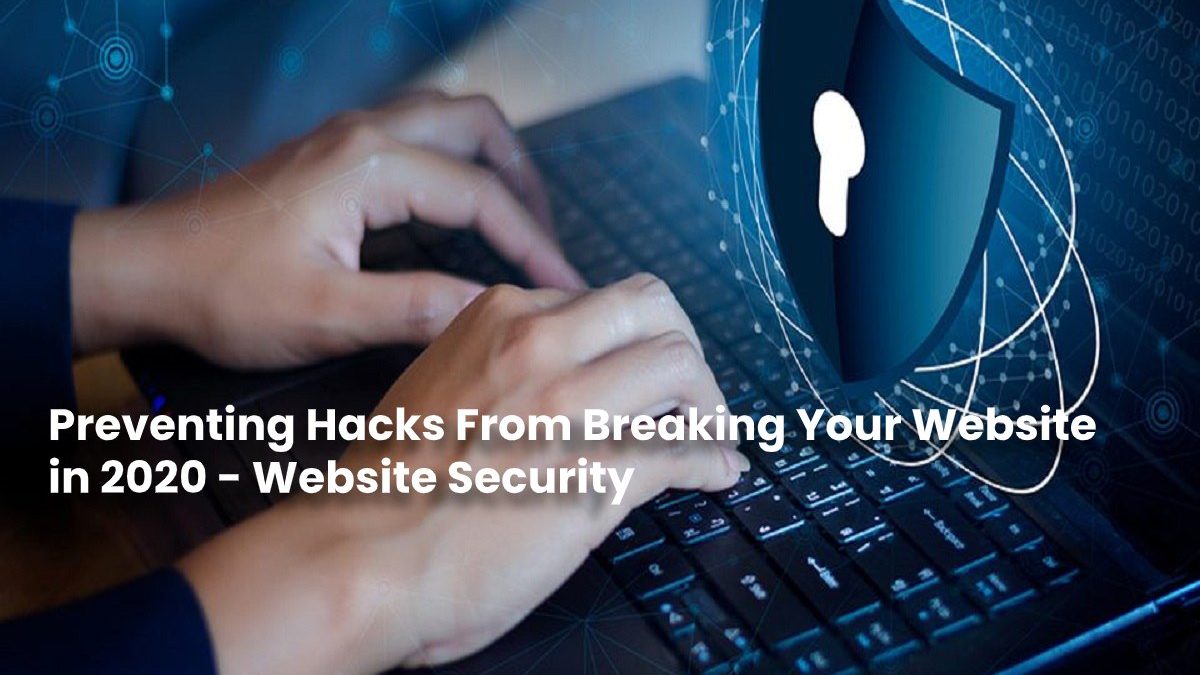Website Security – Websites are the face of any business today. They fulfill a variety of purposes from engaging with your audience to keeping your internal operations running smoothly, which is why your site needs to be secure.
Hackers are a big concern, as the data that customers can leave with your business through your website is always a good target for them. Almost anything can be hacked – if it’s connected to the internet, someone can find their way in.
That’s why building a business website should always integrate security features. Website security has become more important than ever, as recent years have shown that the growth of attacks on websites has only grown. While each way of securing your website can add a decent layer of protection, stacking multiple ways is the most efficient method to protect yourself.
But even using the top web accessibility resources and tools wouldn’t be enough. Securing your website is half your tools and half your mindset – so here are the ways you can get a safer site.
Table of Contents
Why Secure A Website?
Securing a website is all about the agency: the ability to do things on your own without worrying about matters like attacks. In particular, a secure website provides three main benefits:
- Information security: helps you keep your data safe
- Workflow optimization: reduces time spent on authorization for internal use
- Boosts reputation: gives more user confidence in the brand and the website
Website security is a key component in keeping your website safe, allowing you to maintain an active online presence without worrying about external threats. And being thorough about it isn’t just about getting the right software or the best security updates – it needs to be a comprehensive approach to keeping the important things safe.
Securing a website also affects one important thing: your website’s reputation. Like people at a party, your website security is something search engines (or the entire internet at large) will keep track of. If it detects that your security isn’t up to par, it won’t recommend people to visit your website. And depending on the business you’re running, a sudden drop in visitors can be deadly.
What Can Hackers Do Anyway and Why is It a Big Deal?

You might think hacks are the exclusive worry of big companies like Coca-Cola or Equifax, but data has shown that even the smallest business stand to lose a bit if they catch a hacker’s attention. Here is just a sampling of what can happen to your business once it’s been targeted by a hack:
- Draw traffic away from your website by redirecting your website links
- Gain your ad revenue by replacing your ads with their own
- Gain personal details about your consumers, making them easier to hack
- Temporarily shut down your site, making you lose sales
- Steal intellectual property and other products your brand only owns
Unlike bigger companies that can weather these losses somewhat, small to medium enterprises have a lot more to lose. Since most SME sites still do not have adequate website protection, they’ve become a favorite target of hackers in recent years.
It doesn’t matter what kind of business you have or how big or small it is: as long as there is data, there are threats. Hackers can be creative with how they can use security exploit to their advantage. Some methods are so sophisticated that you might not even know that they have already compromised your system! That’s why monitoring website security is so important.
The 10 Ways You Can Protect Your Website From Hacks

So what can you do to protect yourself and your brand? As we’ve mentioned, website security is an all-around thing, from the tools to the right processes. Specifically, your business website should tick off these ten steps for better security:
#1. Find A Good Website Host
When you build a business website, you usually partner up with a host that can take care of the site for you – like how it’s maintained, the code required, and how people can access it. Hosts are useful for building a business website because they also integrate tools that can help you track and improve conversion rates.
But it’s also this convenience that makes webs hosts the favorite target of hackers. That’s why before you partner with any web host, always check if their security package is up to par. We’ll be talking about the specific ones a little later in this article, but having a good security rating (like the ones here) is a good place to start.
#2. Create A Strong Admin Password
You’ve probably heard about the case of making a strong password for your personal accounts, but it’s important if you have a business admin account. A strong admin password can give you an extra layer of security that can take years to crack, keeping you and your website safe.
If possible, create multiple layers of passwords, each that have a specific layer of security credentials to them. Use multiple ways to store this information and always check in with the holders of each password if they’ve been compromised. For extra precaution, regularly change your passwords.
#3. Never Ignore Updates
One way hackers can get into your website is if the programs that protect it are out of date. That’s why always make sure you install ALL security updates when they pop up – this isn’t the stuff that you can afford to ignore like language packs. Updated security software often has the latest shields you need to defend against hacks, which are growing more sophisticated all the time.
A good way to keep this box ticked is to always auto-download and auto-install updates whenever they’re available, and schedule update checks as often as you can. You may experience more downtime on your website by doing this, but the payoff in heightened security is worth the trouble.
#4. Watch Out For SQL Injection Attacks
If you have a little more insight into coding, a good hole to patch up in your website security is preventing SQL injection attacks. These work by piggybacking on allowed access to get higher-level information. Think about it this way: it’s like a wolf getting into your house by using your doggy door. They’re technically ALSO dogs, but you really only want the one inside your house.
You can prevent SQL injections with parameterized queries (also known as prepared statements) instead of string concatenation for access. But if you have little experience in coding, it’s much better to leave this matter to your website host.
#5.Prevent Cross-Site Scripting
Cross-site scripting refers to a hacking method where attackers would put webpages of their own into your website, stealing data and users. Because their webpage appears under your domain, anyone (including the security protocols) can let it through to normally protected areas.
Again, consult with your webmaster about ways to protect yourself against this threat, as patching up this hole needs a careful, full examination of your website’s code.
#6. Always Use HTTPS Protection
HTTPS is the default security system that all websites use to authenticate each other. It’s far more secure than the old HTTP protocol that older sites use and far less vulnerable to hacking. HTTPS protects the communications between your website and web browsers, making it far difficult for hackers to interrupt the data flow between these two points.
Always check if your website domain uses HTTPS encryption. It doesn’t just keep your website safe: most browsers will avoid sites without HTTPS, so you’ll end up losing visitors if you. Don’t get it. More than that, the overall trust in your website will go down, which makes it unlikely to show up on places like Google searches.
#7. Verify Credentials Multiple Times
The typical way you’d log into an account on a website is to input your username and password and perhaps answer a random security question. While this system works fine, it’s also only one point of entry – which makes it vulnerable if you get hacked. Having multiple ways to verify access (or multi-factor authentication) can give your website logins an additional layer of security.
This can come in many forms, but the easiest one to implement is to send a code to another device that the user has with them at the time that they login like their phone. That way, a hacker can’t brute-force their way into your system without having access to the other devices that need credentials so they can log in.
#8. Monitor Your Network
While having automated security systems on your website can help security, you should also be proactive with your protection. Regularly conduct security audits on your website to make sure that all of your software is up to date and your credentials check out. Just waiting for an attack can be dangerous, so it’s best to poke around in your security suite to see how it holds up.
One good way to do this is by using a network penetration test, where your security system gets attacked by a simulated hack or another form of cyberattack. If it seems a bit weird to be looking for holes in your security system, finding one means that you have time to patch it out before actual hackers try that route.
#9. Use VPN Software
You may have heard a lot of talk about what is VPN and its meaning, but Virtual Private Networks are a key part of data security and privacy. A VPN works by temporarily masking your IP address (think of it as your computer system’s home address) whenever you access the web, making it difficult for hackers to figure out where your system is and how to exploit it.
VPN has a ton of benefits, including but not limited to:
- Keeping your incoming and outgoing data secure
- Protects your data over any kind of internet connection
- Has no geographic limitations, allowing you access content from anywhere to anywhere else
VPN security is a relatively new addition to security suites, so ask your website host if they offer it to entrepreneurs. By using a Top rated VPN, you gain a lot of confidence in the security and privacy of your data, allowing you to work from anywhere you want to. Perfect for today’s “work-from-anywhere” culture!
#10. Beware Of Fake Error Messages
One effective way that hackers can manipulate you or your users to give up information is to pretend that something has gone wrong with the site. This encourages people to sign in to a fake webpage with their security credentials, giving them to the hackers that will log on to their real account. It’s a tactic that relies on panic and lack of information – so it’s in countering those that you get to patch this security issue.
If you get an error message (especially if you’re an admin) and it requires your credentials to access, give your web host or webmaster a call. Verify that something is actually wrong before putting anything into the login screen, as hackers can make some convincing error messages that look just like the real thing. Don’t just think this happens with the website itself: even emails are vulnerable to this method of attack.
Conclusion
Proper website security doesn’t just protect you from bad people: it also protects you from bad practices and user error with accessing your site. While we think most cyberattacks on websites are from outside sources, a good part of what makes a website vulnerable also comes from the people that run it.
Being careless about login information, using unprotected devices, and even clicking the wrong buttons are all potential ways a hacker can get into your system and compromise your data. So even if you get the latest security software, always make sure you’re taking the steps yourself to keep your website secure.
And ultimately, it’s the people that make website security so important. Any person who visits your website, customer or otherwise, leaves a little part of their digital footprint behind. It falls on your shoulders as a responsible company to not violate the trust they’ve placed in you with that information.
Kamran Sharief
Related posts
Sidebar
Recent Posts
The Best Forex Brokers for Beginners
Since COVID-19 first popped up, interest in the forex market has increased dramatically. Knowing how to get involved with minimal…
Maximizing Success: The Symbiosis of Dedicated Software Development Teams and Product Design Services
The Symbiosis of Dedicated Software Development Teams and Product Design Services In the rapidly evolving landscape of technology, businesses aiming…



